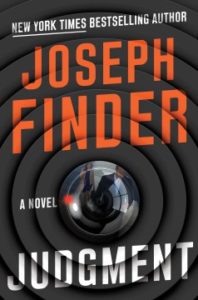Joseph Finder on the Element of Surprise
Suspense writer Joseph Finder examines the art of twists and shocking endings as he discusses the element of surprise in five novels with endings he never saw coming.
There’s a paradox to being a suspense writer. We writers get into this business because we love reading—but the more we read, the more we write, the better we get at figuring a book out. We’ve worked with the clockwork mechanism. Our fingers still have grease on them. So writing mysteries and thrillers comes with a cost: sometimes the reading experience gets ruined because we’re too skilled at predicting the endings.
But not always.
It’s the hope of being surprised that lures us to these books from a young age.
As a kid, I read voraciously, like most writers I know. I was reading Ian Fleming’s James Bond thrillers as a teenager before moving on to Robert Ludlum in college—and once I knew I wanted to write that type of book myself, I read as much as I could, as widely as I could. Frederick Forsyth, Helen MacInnes, Ken Follett, William Goldman, Mario Puzo, Raymond Chandler, James M. Cain, Agatha Christie, Arthur Conan Doyle . . . I was reading for pleasure, but I was also reading to figure out how these authors did what they did. How did they drop clues? How did they distract the reader? And most of all, how did they surprise us?
It’s one of the watchwords posted above my computer: Reverse, reveal, SURPRISE.
As I read mysteries and thrillers, I’m looking for the surprise. I’m watching for the hints the author drops. I’m noticing the extraneous detail. I’m refusing to spend too much time wondering about the obvious false trails.
And yet, once in a while, to my delight, I’m still surprised. Nothing pleases me more than reading a book whose ending I truly didn’t see coming.
These “twist” endings sometimes become a little too well known, spoiling the book (or the film) for latecomers. I’m glad I read an early copy of Gillian Flynn’s Gone Girl, for example, though I’d admire the book just as much if I hadn’t been surprised. The movie of Fight Club gave away the shocking twist in Chuck Palahniuk’s novel, though the book is still very much worth reading. The surprises at the end of Agatha Christie’s And Then There Were None and The Murder of Roger Ackroyd have become almost all anyone remembers about those books, though they’re well-constructed mysteries full of sharp observations about the societies they describe.
It’s hard to talk about shocking endings without giving too much away, but here are five novels whose endings truly surprised me.
The Wife by Alafair Burke (2018). It’s a story that feels ripped from the headlines, about a woman whose successful husband denies accusations of sexual harassment. It is also a masterful exercise in misdirection whose last page made me swear out loud. Good thing I wasn’t on a plane.
Die of Shame by Mark Billingham (2016). I had known Mark Billingham mainly for his excellent Tom Thorne police procedurals. Die of Shameis a classic British village mystery updated to the most modern of settings, a London addiction-therapy group that loses a member to murder. Its ending is both completely surprising and fully justified, which is the golden mean of crime fiction.
Tell No One by Harlan Coben (2001). Harlan’s fooled me a couple of times, but this was his first standalone, and the ending still impresses me. Eight years after the murder of Dr. David Beck’s wife, Elizabeth, David gets an email that makes him wonder whether Elizabeth might still be alive.
Shutter Island by Dennis Lehane (2003). Lehane is no amateur when it comes to surprise—I had to read a particular page of Mystic Rivera couple of times in order to reassure myself that yes, I got that right, but Shutter Islandis a different order of magnitude, up there with classics like And Then There Were None. US Marshal Teddy Daniels, still mourning the loss of his wife, hunts for an escaped patient on an island that houses the criminally insane. When I finished reading this book, I immediately started it again so I could figure out how he’d done it.
What the Dead Know by Laura Lippman (2007). The teenaged Bethany sisters disappear from a shopping mall in the 1970s. Thirty years later, a woman involved in a car accident claims to be one of those sisters. She tells a story that doesn’t add up, while a Baltimore detective pursues the truth. Another surprising but deeply satisfactory ending.
Joseph Finder is the New York Times bestselling author of fourteen previous suspense novels, including The Switch, a stand-alone thriller, and Guilty Minds, the third to feature “private spy” Nick Heller. Joe’s novels High Crimes (1998) and Paranoia (2004) have been adapted as major motion pictures.

